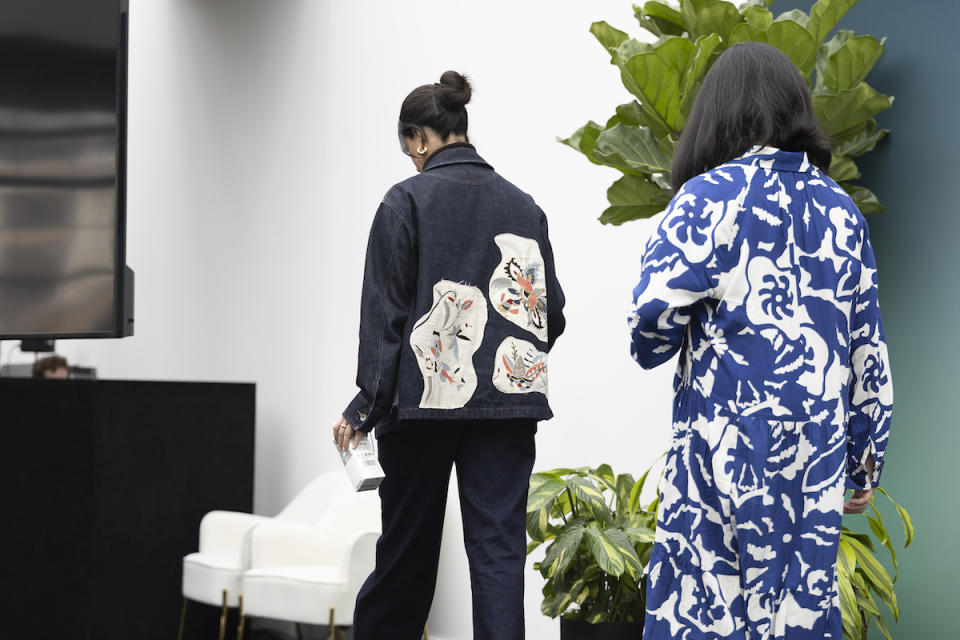Clothing With a Conscience: Uniqlo Stays True to Japanese Roots

Wabi-sabi. Ikigai. Kintsugi. These—among many more—Japanese philosophies are popular in the Western world; cleaning consultant Marie Kondo sold more than 13 million copies of her book “The Life-Changing Magic of Tidying Up” and landed a certified fresh reality show on Netflix in 2019 based on these prinicples.
The popular Japanese casualwear brand Uniqlo also has a philosophy guiding its business practices. And it’s safe to say it’s been effective: the Fast Retailing-owned retailer took home more than $2.5 billion in fiscal 2023.
More from Sourcing Journal
FIT's Sustainability Conference Wants to Reimagine Fashion's Future
Tapestry, Faherty On the Path From Greenwashing to Green Governing
Seneiya Navajas, sustainability senior manager, Fast Retailing U.S. at Uniqlo, spoke about the fast fashion brand’s “LifeWear” doctrine with Jasmin Malik Chua, Sourcing Journal’s sourcing and labor editor, during a candid conversation at the third edition of the Road to 2030 Sustainability Summit.
“LifeWear is what we call our apparel, and it really follows this concept of design that tries to make everyday life better,” Navajas said during the panel. And the entire company (more than 2,400 stores worldwide powered by 30,000-plus employees, for reference) is organized around this idea of thoughtfulness and simplicity, Navajas explained—finding, producing and delivering garments with intention.
“At Uniqlo in general, we try to create clothing that is essential,” Navajas said. “We really seek for our customers to try to use it for a long time.”
This dogma is what drove the firm to establish Re.Uniqlo—a framework that helps maximize the utility of Uniqlo’s clothing to contribute to the circular economy—more than 20 years ago. In brick-and-mortar stores worldwide, the casualwear giant has these boxes to amass secondhand Uniqlo garments for reuse and recycling and to be donated to people in need.
Uniqlo “thoughtfully” partners with organizations like the UN Refugee Agency (UNHCR), Navajas said, to provide this clothing. To date, Uniqlo has donated over 54.6 million new and used items to over 80 countries and regions worldwide.
“We also try to prioritize local communities depending on their needs,” Navajas continued. In New York City, for example, the tech wear titan has partnered with the Department of Homeless Services (DHS) since 2014 and has provided more than 300,000 garments in the last 10 years.
“We really try to engage with them and understand the real needs of the community,” Navajas said.
Under the Re.Uniqlo umbrella is also Re.Uniqlo Studios, which first opened in Berlin two years ago and has since expanded to major cities like Chicago and Los Angeles.
The repair studios allow consumers to bring in their garments with a hole or two for a simple repair. For $5 a mend, available services include re-sewing split seams, reattaching buttons, patching holes in knitted garments or stitching tears in down products as well as patching tears in denim.
Plus, customers can customize their Uniqlo goods into one-of-a-kind pieces through the company’s Sashiko service—a Japanese technique of embroidering clothing with geometric patterns to repair or fortify them—available in London and Japan.
“We also started to offer collections of upcycled items,” Navajas explained. These are items that, for example were returned with mascara or foundation stains, therefore unable to rehit the shelves. Instead, “we upcycle it to be able to offer a very useful life to it” with a “unique perspective that our customers would actually want to wear.”

Chua pointed out that while repairing and upcycling are labor-intensive processes, Uniqlo does believe they are scalable operations. There are currently 42 studios in 19 markets, though the company aims to reach 50 by the end of this year.
“How we’re doing this is we’re really trying to leverage and work utilizing our existing infrastructure and know-how,” Navajas said. The brand is also tapping design schools like the Fashion Institute of Technology and emerging designers like Sho Konishi to transform unsellable items into unique garments.
In doing so, Chua said, Uniqlo is prioritizing emotional durability; a concept Navajas “loves” as it’s naturally aligned with the brand’s core values.
“For Uniqlo, it’s naturally aligned with our concept of LifeWear and LifeWear comes from strong Japenese values; longevity, thoughtfulness, simplicity, respect and responsibility—those are Japanese values quite embedded in everything we do,” Navajas said. “There’s a phrase, ‘mottainai,’ which conveys this sense of regret over waste. I think that’s a really nice way to encompass Uniqlo.”